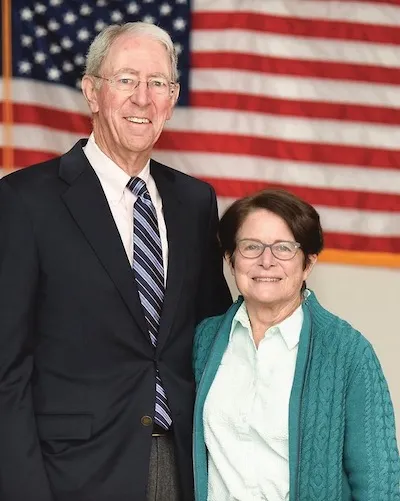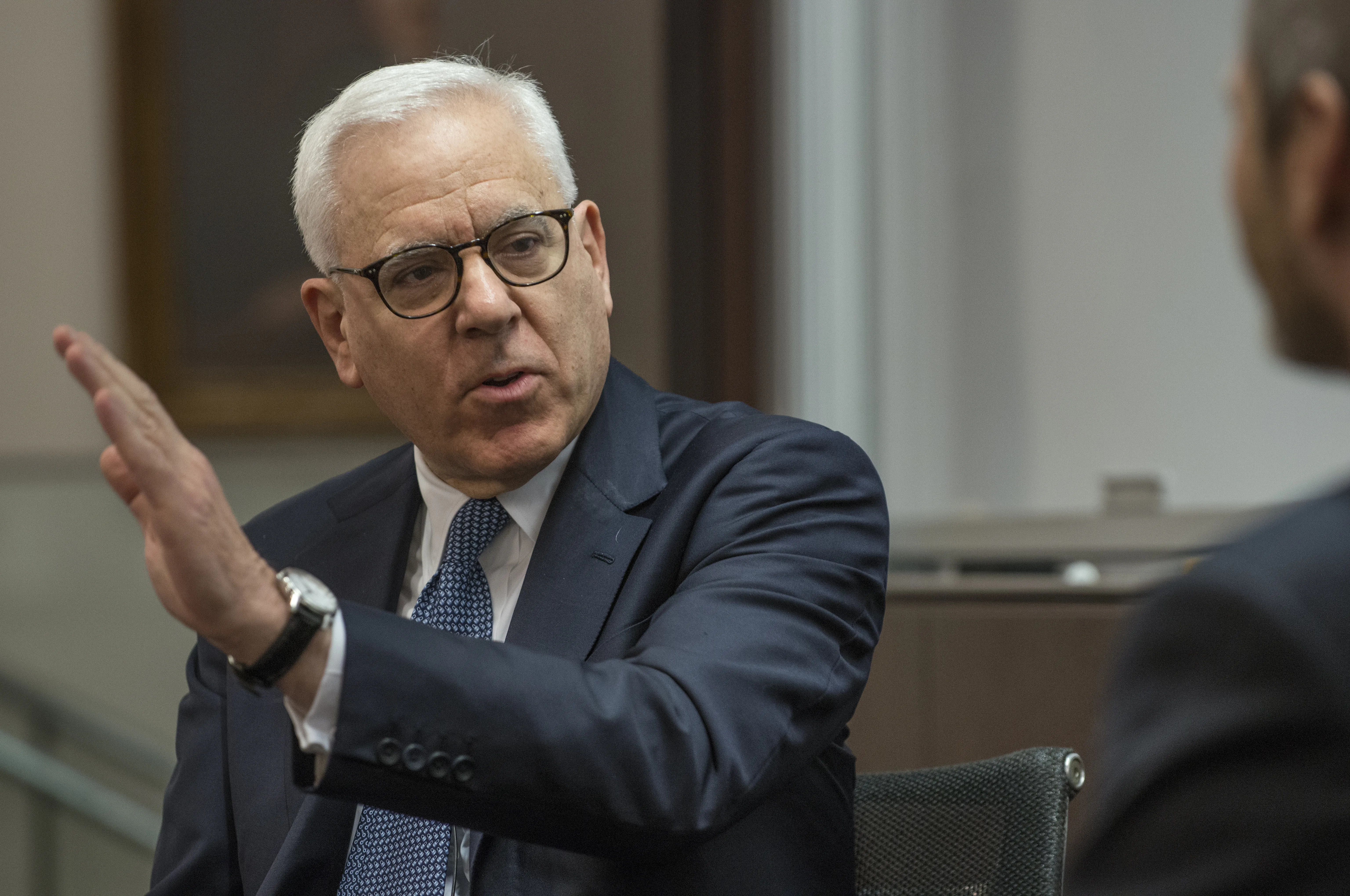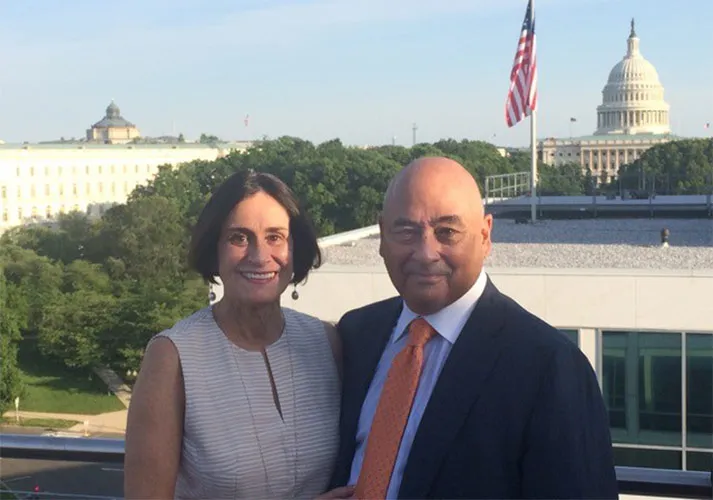The Kapnick Leadership Development Initiative: Translating a Successful Booth Class to the Law School
[Editors note: Shortly after this article was published, the name of the program was changed to the Kapnick Leadership Development Initiative. The name has been changed in this article to avoid confusion.]
Amy Gardner, ’02, Dean of Students at the Law School, knows her students are smart, and she knows that they will do great things. But she also knows that they do not always arrive at the Law School ready to be leaders in the legal profession.
“Our students have always been the best at everything they have ever done, but their pursuits up until law school have often been solitary,” said Gardner. “Many of them have never had an assistant or worked on a team, taken orders from multiple bosses at once, or failed at anything and had to get back up on the horse. They rarely have any idea what their management style is, nor how to develop a good one. We want our students to be successful and become leaders, so we need to help them invest in themselves and go into the working world knowing who they are and how to lead.”
Through the generosity of Scott, JD/MBA ’85, and Kathleen Kapnick, ’84, the Law School is introducing a bold new program to do just that. The Kapnicks have made a $2 million gift jointly to the University of Chicago Law School and the Booth School of Business to develop a program for law students modeled after Booth’s LEAD course. LEAD (Leadership Effectiveness and Development) is a leadership development class taken by Booth students during Orientation and the fall quarter of their first year. The Kapnicks’ gift will support a leadership and professionalism initiative at the Law School for at least four years, run jointly by the Leadership Development staff at Booth and the Law School’s Office of the Dean of Students.
“I am tremendously excited to offer this opportunity to our students,” said Dean Michael Schill. We have always provided our students with the most rigorous academic training of any law school in the nation, and that will never change. While we have always graduated students who have gone on to become leaders in a wide variety of professional arenas—private legal practice, academics, business, the judiciary, and government—up until now we have not been systematic in our approach. With the Kapnick gift that has all changed.”
The Genesis of LEAD at the Law School
The new Kapnick Leadership Development Initiative resulted from three separate, but related processes. In 2010, the Law School hosted a LEAD pilot for its student leaders over a weekend. When Dean Gardner became Dean of Students in 2010 she began the innovative Keystone Professionalism and Leadership Program, which focused on preparing students for successful careers as legal professionals. Last year, Gardner presented the Keystone Program to the Law School’s Visiting Committee and alumni breakout sessions and a subsequent plenary session considered the wisdom of a full-scale leadership initiative.
“To be truthful,” Dean Schill said, “I half expected that our alumni would roll their eyes and say that focusing on what some call the ‘soft skills’ was not appropriate for a school like the University of Chicago. Indeed, I myself was a skeptic. To my surprise, however, the idea of a leadership initiative resonated deeply with our alumni.” Alumni focused on the idea that the Chicago Law “comparative advantage” is the minds of the students—we have always trained them well in the law. But the Visiting Committee stressed that employers also want them to be trained to have mature judgment, strong interpersonal dynamics, skill in using diverse resources, and a deep understanding of clients and judges. Self-assessment and teamwork, the Visiting Committee said, are at the core of these skills. One member pointed out that while it is more than possible to succeed in law school being entirely solitary, it is impossible to do that either in legal practice or in the business world. Law schools need to teach the skills necessary to succeed as both a leader and a follower on a team, they noted, and until now, few have tried to do so. While some law firms and businesses offer this kind of training as part of their employees’ professional development, alumni said that there could be a tremendous benefit to students getting this training in the very early stages of their careers and with the rigor and expertise so inherent in programs run by the Law School and Booth.
Among those who was most passionate about the need for a Law School based leadership initiative was Robert Riley, ’78, Chairman of Schiff Hardin, LLP. “The demands of private practice in a law firm environment are evolving quickly,” Riley said. “Sophisticated clients expect not just analytical brilliance from their lawyers but also strong interpersonal and translational skills. They want to be served by cohesive, efficient teams that understand and embrace their priorities and expectations. I applaud the Law School’s Leadership Development Initiative. It demonstrates that the University of Chicago Law School remains a dynamic thought leader in legal education, and its students will be the direct beneficiaries.” Shortly after the Visiting Committee meeting, Dean Schill met with Scott and Kathleen Kapnick to discuss their participation in the upcoming university fundraising campaign. Scott Kapnick, the CEO of Highbridge Capital Management, was familiar with the LEAD class at Booth through his nephew, Daniel Kapnick, who graduated from Booth earlier this year. He suggested that Schill consider extending LEAD to the Law School. Kathleen Kapnick, who has enjoyed a successful law career, concurred, recognizing the critical need for a LEAD-style offering at the Law School.
Primed by the Visiting Committee’s enthusiasm for leadership and professionalism training, Dean Schill informally discussed with faculty members the Kapnicks’ idea of extending LEAD to the Law School. In June of this year, following a meeting in New York with Deans Schill and Sunil Kumar of the Booth School, a gift agreement was signed. Scott Kapnick, who has been an active member of the Law School’s Business Advisory Council, thought that this would be a wonderful way to get the two schools to work jointly on a project that could be a model for future cooperation.
The Kapnick Leadership Development Initiative
The Kapnick Initiative will be based upon Booth’s existing LEAD class, one of the first experiential leadership development courses at a major business school. LEAD was inspired by the work of Harry Davis, the Roger L. and Rachel M. Goetz Distinguished Service Professor of Creative Management at Booth. All Booth students participate in LEAD, which is a required part of the curriculum. As Booth’s website describes, LEAD is “designed to enhance students’ self-awareness and interpersonal effectiveness by providing them with an opportunity to benchmark themselves with respect to critical aspects of leadership—working in teams, influencing others, conflict management, interpersonal communication, [and] presentation skills.” LEAD begins with an off-site retreat in which students are introduced to their classmates through a series of team-building exercises, leadership challenges, and social events. This is the first opportunity for students to better understand their own leadership styles and effectiveness in team situations. Upon arriving back on campus, Booth students continue to participate in “modules” throughout Orientation and the fall quarter. Each module addresses a particular area of leadership development, such as communication, working in teams, or influencing and inspiring others. Through a wide variety of feedback sources (including a personality profile assessment), students learn more about their own style as well as how best to work with people of differing styles. Students also receive some customized communication training. Through a series of recorded exercises, students learn how they are perceived in a group setting and learn to better communicate their own ideas and listen to the ideas of others.
A key component of LEAD for full-time students is the use of “facilitators,” who are second-year Booth students who execute the class session under the supervision of Leadership Development staff. These students take a special course at the end of their first year at Booth to prepare for their facilitator roles and work with the Leadership Development staff to design and adapt the course content. “As a junior analyst or associate in the workplace, we often get completely caught up in the tactical problem solving and rarely pause to reflect on how we communicate or manage others during the process, said Amelia Runyan, JD/MBA ’14, who took the LEAD course as part of her MBA studies and serves as a facilitator at Booth. “As LEAD Facilitators, we have the opportunity to further reflect on our individual leadership styles and apply this self-awareness while working with other facilitators to develop curriculum and engage with the first-year class as they learn more about themselves.”
Adapting LEAD to the Law School
Many of the details of Kapnick Leadership Development Initiative will be worked out over the coming year under the oversight of a faculty committee chaired by Eduardo Peñalver in anticipation of a Fall 2014 “launch.” It is expected that the program will be mandatory for all incoming Law School students. The Kapnick Program will largely take place during Orientation and will supplement rather than supplant existing offerings. The 1L curriculum and the Bigelow program will continue as usual.
The Law School’s leadership and professionalism initiative is expected to focus on many of the same areas that are part of Booth’s course: personality preferences and leadership styles, working in teams, and interpersonal communication and presentation skills. An off-site training will begin the program at the start of Orientation, and the program will continue with classroom-taught modules during Orientation and some Friday afternoons in the first part of the fall quarter. According to Gardner, “our students begin thinking about their 1L summers as early as November; we want to ensure that they can put their leadership and professionalism training to work for them in that job search and in their 1L summer jobs.”
While most of the leadership and professionalism training will take place during Orientation and the fall quarter, those students who become 3L facilitators will have additional opportunities to develop their leadership skills. As law students go through the experience, third-year law students will have the opportunity to become facilitators themselves. Schill expects these positions to be in high demand: “Though the workload will be high for these students, the personal and professional rewards will be immense. What better way to both practice and demonstrate leadership than to help design and run a leadership program for your peers?”
“LEAD has definitely been one of the core pieces of my graduate education,” said James Schulte, JD/MBA ’14. “I still think about the lessons I learned during LEAD, including about how I am perceived, how I work in teams, how my personality and preferences shape my interactions, and how I handle conflict. I don’t think I am anywhere near done learning about how I can be a better leader and team member, but LEAD gave me a huge boost on my development path. We spend most of our time during law school working as individuals, but in the real world we will be working closely with colleagues. LEAD will help us law students think about how to approach these situations better.”
In true Chicago fashion, the program will be evaluated in its third year. It is expected that data will be collected to compare early outcomes of students participating in the Kapnick Initiative with the experiences of prior cohorts who did not participate in the program. After analyzing the results from this evaluation, a decision will be made on whether to make leadership and professionalism training a permanent fixture of the Law School.
Pieces Moving Into Place
Though the full Kapnick Initiative will not be implemented until the fall of 2014, the entering Class of 2016 experienced a number of the pieces of LEAD during Orientation this fall. Jeff Anderson, Associate Dean for Leadership Development for the full-time students at Booth, taught a session on “initial impressions” during Professionalism Day. Following a successful pilot program in the spring of 2013, the famed Second City improvisational theater company taught a workshop to all 1Ls (organized by Bigelow sections) about improving communication skills and how to be more comfortable thinking on their feet. This coming spring, 1L students will prepare for their Bigelow oral arguments by participating in videotaped exercises to study how others see them and to allow them to adjust their presentation style. This three-part series is sponsored by Schiff Hardin, which has taken a strong interest in professionalism training at the Law School for a number of years. Schiff ’s support had been spearheaded by chairman of the firm Robert Riley, ’78, and Professional Development Partner Lisa Brown, ’95.
Schill understands just how unusual and powerful a leadership and professionalism program can be and expects the Kapnick Initiative not only to be very successful but also to be widely copied in years to come. “The Law School has been the gold standard in training students’ minds,” he said, “but alumni have often been left on their own in navigating their long-term professional lives. Students can be trained to find their strengths and minimize their weaknesses once they understand what those are and how they work in the professional world. And having access to an alumni base who has been through this training will give each individual graduate an even stronger network upon which to draw.”
Gardner is excited to see all the planning and hard work come to fruition. “We have been thinking about these issues for a long time,” she said, “and with the help of our faculty committee, our JD/MBA students, our colleagues at Booth, our Visiting Committee, and, most of all, Scott and Kathleen Kapnick, we are going to soon make these plans a reality. I can’t wait to see the effect this program has on our already wonderful students.”


